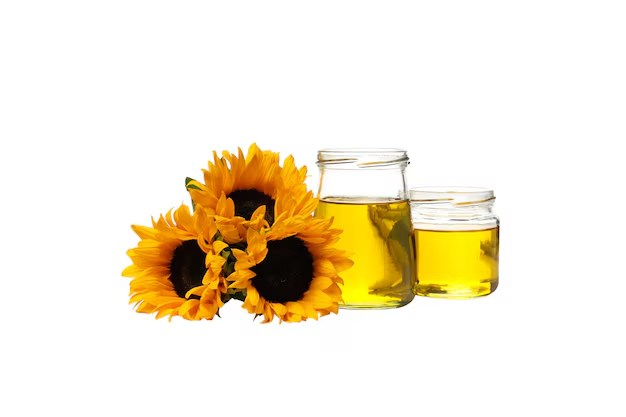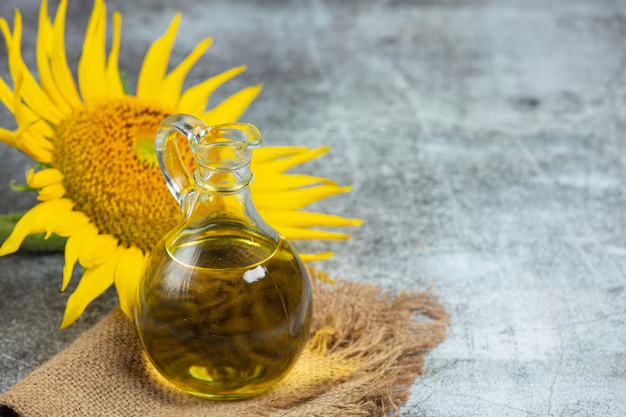Sunflower oil is a widely used cooking oil known for its light flavor and versatility. It’s a common ingredient in frying, baking, and salad dressings. However, debates about its health implications leave many people wondering—is sunflower oil healthy? To answer this question, let’s explore its composition, benefits, and potential risks.
What Is Sunflower Oil?
Sunflower oil is extracted from the seeds of the sunflower plant (Helianthus annuus). It is celebrated for its high smoke point and neutral taste, making it ideal for various cooking techniques.
Types of Sunflower Oil
- High-Oleic Sunflower Oil: Rich in monounsaturated fats, ideal for heart health.
- Mid-Oleic Sunflower Oil: A balance of monounsaturated and polyunsaturated fats.
- Linoleic Sunflower Oil: High in polyunsaturated fats, commonly used in processed foods.
Each type offers unique nutritional properties, catering to different dietary needs.
Nutritional Profile of Sunflower Oil
Sunflower oil is calorie-dense, like other cooking oils, but its specific fat composition makes it stand out.
Caloric Content
One tablespoon of sunflower oil contains about 120 calories, primarily from fats.
Fat Breakdown
- Saturated Fats: About 10%, which can raise cholesterol when consumed excessively.
- Monounsaturated Fats (MUFA): 20-50%, depending on the type; beneficial for heart health.
- Polyunsaturated Fats (PUFA): 40-70%, particularly linoleic acid, essential for bodily functions.
Vitamin E and Antioxidants
Sunflower oil is an excellent source of vitamin E, a powerful antioxidant. Vitamin E supports skin health, boosts immunity, and protects cells from oxidative damage.
Health Benefits of Sunflower Oil
Despite its controversies, sunflower oil offers several potential health benefits.

Heart Health
Sunflower oil, especially high-oleic variants, is known to reduce bad cholesterol (LDL) levels. According to WebMD, replacing saturated fats with monounsaturated fats like those in sunflower oil can improve overall heart health. It may also help maintain healthy arteries by lowering the risk of atherosclerosis.
Anti-Inflammatory Properties
Sunflower oil contains omega-6 fatty acids, which play a role in the body’s inflammatory processes. While moderate consumption may benefit conditions like arthritis, Healthline emphasizes the importance of balancing omega-6 intake with omega-3 fatty acids to prevent chronic inflammation.
Skin Health
Sunflower oil is popular in skincare products for its soothing properties. WebMD highlights its use in treating eczema, thanks to its moisturizing and anti-inflammatory effects. It also aids in wound healing by promoting faster tissue repair and reducing redness.
Related to Read: Are Sunflower Seeds Healthy? Exploring Their Nutritional Benefits
Potential Risks and Concerns
While sunflower oil has its advantages, it is not without potential drawbacks.
Omega-6 Fatty Acids and Inflammation
Although omega-6 fatty acids are essential, excessive intake without adequate omega-3s can contribute to chronic inflammation. This imbalance is linked to conditions like heart disease and type 2 diabetes, according to Healthline.
Formation of Toxic Compounds When Heated
When sunflower oil is heated to high temperatures, it can release harmful compounds such as aldehydes. These toxins, as explained by Healthline, may increase the risk of cancer and other health issues. It’s crucial to use sunflower oil appropriately and avoid overheating it.
Impact on Individuals with Specific Health Conditions
People with obesity, chronic inflammation, or metabolic disorders should be cautious with sunflower oil consumption. The high omega-6 content may exacerbate certain conditions, making it essential to consult a healthcare professional before regular use.
Sunflower Oil vs. Other Cooking Oils: How Does It Compare?
When choosing the best cooking oil, it’s crucial to weigh their nutritional profiles, health benefits, and cooking suitability. Sunflower oil is a popular choice, but how does it stack up against other common oils like olive oil, canola oil, and coconut oil? Let’s break it down.
Sunflower Oil vs. Olive Oil
Sunflower oil and olive oil are staples in many kitchens, but they differ significantly in composition and benefits.
Nutritional Profile
- Sunflower Oil: High in vitamin E and polyunsaturated fats (PUFAs), particularly linoleic acid. High-oleic varieties contain more monounsaturated fats (MUFAs).
- Olive Oil: Rich in MUFAs, particularly oleic acid, which supports heart health. It also contains polyphenols, powerful antioxidants with anti-inflammatory properties.
Health Benefits
According to the Olive Wellness Institute, olive oil outshines sunflower oil in promoting cardiovascular health due to its higher MUFA and antioxidant content. Sunflower oil is still beneficial, particularly for those needing more vitamin E in their diet.
Cooking Suitability
- Olive Oil: Best for medium-heat cooking and dressings. Extra virgin olive oil has a low smoke point but offers superior flavor and health benefits.
- Sunflower Oil: Better for high-heat cooking due to its higher smoke point, especially the high-oleic variety.
Sunflower Oil vs. Canola Oil
Both oils are versatile and widely available, but they serve different purposes in cooking and health.
Nutritional Profile
- Sunflower Oil: Rich in vitamin E and linoleic acid but lacks omega-3 fatty acids.
- Canola Oil: A good source of alpha-linolenic acid (ALA), a type of omega-3 fatty acid, along with MUFAs.
Health Implications
Canola oil may have a slight edge for heart health due to its omega-3 content. However, sunflower oil’s high vitamin E levels make it beneficial for skin and immune health.
Cooking Suitability
Canola oil is versatile and suitable for baking, sautéing, and frying. Sunflower oil’s high-oleic variety is better for high-heat applications due to its stability.
Sunflower Oil vs. Coconut Oil
Coconut oil has gained popularity as a health food, but how does it compare to sunflower oil?
Nutritional Profile
- Sunflower Oil: High in unsaturated fats, making it heart-friendly.
- Coconut Oil: Contains over 80% saturated fat, mainly in the form of medium-chain triglycerides (MCTs), which provide quick energy.
Health Impact
While coconut oil’s MCTs have some health benefits, its high saturated fat content can raise LDL cholesterol levels, potentially increasing heart disease risk. Sunflower oil, especially the high-oleic type, is a better choice for heart health.
Cooking Suitability
Coconut oil has a distinct flavor and is stable at high temperatures, making it suitable for frying and baking. Sunflower oil’s neutral taste makes it ideal for a wider range of dishes.
Recommendations for Consumption
To get the most out of sunflower oil, it’s essential to use it wisely and in moderation. Here are some tips to ensure a balanced and health-conscious approach.

Moderation and Dietary Balance
Sunflower oil can be part of a healthy diet, but it should not be the sole source of dietary fat. Balance your intake by incorporating other healthy fats, such as those from olive oil, nuts, seeds, and fatty fish. Excessive consumption of omega-6 fatty acids, found in sunflower oil, can contribute to inflammation if not balanced with omega-3-rich foods.
- Pair sunflower oil with omega-3 sources like salmon or flaxseeds.
- Limit its use in processed foods to reduce overall omega-6 intake.
Cooking Methods and Temperature Considerations
Using sunflower oil correctly is crucial to preserving its health benefits and avoiding harmful effects.
- Avoid Overheating: High temperatures can cause sunflower oil to release toxic compounds like aldehydes. Use high-oleic sunflower oil for frying, as it is more heat-stable.
- Choose the Right Applications: Use sunflower oil for roasting, sautéing, and frying, but opt for extra virgin olive oil for dressings and dips.
- Store Properly: Keep sunflower oil in a cool, dark place to prevent oxidation and rancidity.
Related to Read: Is Olive Oil Healthy? An In-Depth Look at Its Benefits
Conclusion
Sunflower oil is a versatile cooking oil with unique benefits, including its high vitamin E content and heart-friendly properties. However, its healthfulness largely depends on the type you choose and how you use it. Compared to other oils like olive, canola, and coconut, sunflower oil holds its own in specific applications but isn’t a one-size-fits-all solution. The key is moderation and variety—by balancing sunflower oil with other healthy fats, you can enjoy its benefits without compromising your overall health.
Frequently Asked Questions (FAQs)
Is sunflower oil safe for high-heat cooking?
Yes, sunflower oil is safe for high-heat cooking, particularly the high-oleic variety. It has a high smoke point, making it suitable for frying and roasting. However, avoid overheating it to prevent the formation of harmful compounds.
Can sunflower oil cause inflammation?
Sunflower oil contains omega-6 fatty acids, which can contribute to inflammation if consumed in excess. To minimize this risk, balance your omega-6 intake with omega-3-rich foods, such as fish, chia seeds, or walnuts.
What are the alternatives to sunflower oil for heart health?
For heart health, consider oils rich in monounsaturated fats and omega-3s, such as olive oil, avocado oil, and canola oil. These options offer additional benefits, including anti-inflammatory properties and improved cholesterol levels.
Does sunflower oil go bad?
Yes, sunflower oil can go rancid if exposed to light, heat, or air for extended periods. Store it in a cool, dark place and use it within its expiration date to maintain freshness.
Can I use sunflower oil for skincare?
Absolutely! Sunflower oil is rich in vitamin E and has moisturizing properties. It’s often used to soothe dry skin, treat eczema, and promote wound healing. Apply a small amount directly to the skin or mix it with your favorite lotion.


